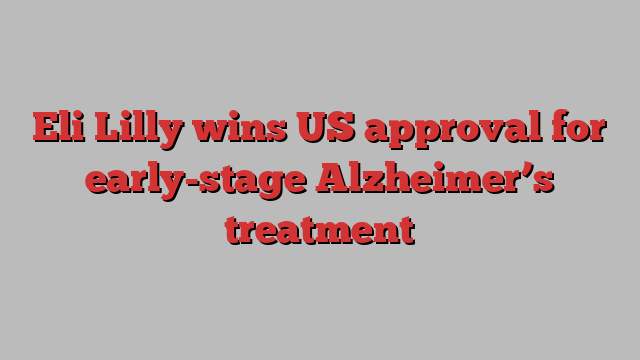
Stay informed with free updates
Simply sign up to the Pharmaceuticals sector myFT Digest — delivered directly to your inbox.
Eli Lilly is gearing up to launch its Alzheimer’s drug for use in early-stage patients after receiving US approval on Tuesday, offering the medicine at a steep premium to a competitor as it claims it is more efficient.
The drug — to be sold under the brand name Kisunla — will enter the US market a year after the first fully approved medicine to treat the neurodegenerative disease, developed jointly by pharmaceutical groups Biogen and Eisai, was launched.
The drug slows the development of Alzheimer’s, which causes memory loss, dementia and other cognitive impairment. An estimated 7mn patients suffer from Alzheimer’s in the US. More than 1mn early-stage patients will be eligible for Eli Lilly’s drug.
Kisunla, known scientifically as donanemab, will be sold at a list price of $32,000 per year of treatment, 20 per cent higher than the $26,500 yearly cost of the rival treatment, Leqembi.
In an interview, Anne White, president of Eli Lilly’s neuroscience division, defended the higher price, saying the treatment was less costly to health systems as it typically requires fewer infusions than Leqembi.
Both treatments work by targeting amyloid plaque, a protein that builds up in the brain of Alzheimer’s patients. But Eli Lilly’s medicine requires less frequent infusions than Leqembi, which frees up capacity, and patients can come off it after clearing amyloid, allowing them “to stop and not continue to pay drug costs”, White said.
Eisai did not immediately respond to a request for comment.
Kisunla slowed cognitive decline by 35 per cent in phase 3 trials. Nearly half of patients on the trial cleared amyloid after a year, allowing them to come off the treatment (the cognitive damage linked to amyloid still remains, however).
Some analysts have become bearish about the success of Kisunla, warning doctors may be less likely to prescribe the medicine because of a higher incidence of rare side effects, including brain swelling, compared with Leqembi, and that the drug could be eclipsed by a more convenient, subcutaneous version of Leqembi expected to launch next year.
Leerink analysts earlier this month cut their 2030 sales projections for Kisunla to $500mn, suggesting it may fall short of so-called “blockbuster” status of $1bn in sales and well below analysts’ consensus estimates of $3.7bn for 2030. The Food and Drug Administration delayed an approval decision for the drug earlier this year, calling in a panel of outside experts to review the medicine.
Nonetheless, Eli Lilly’s market value of more than $850bn remains near all-time highs, propelled by a huge windfall from a new class of diabetes and weight-loss drugs Mounjaro and Zepbound.
Last year, Medicare, a US government-backed healthcare programme for over-65s, said it would cover Kisunla if it received full regulatory approval as well as covering imaging scans needed to check patients’ eligibility to receive the drug. Leqembi is projected to cost the programme $550mn this year and $3.5bn in 2025.
The rollout of Leqembi has been slow, however, particularly because Medicare Advantage plans, which cover 30.8mn over-65s on the scheme, have balked at covering the costly scan.
White said there was “good movement” on scans being covered, with “almost all patients processing claims successfully”. But she said “the heavier lift is making sure that people are aware that there’s coverage, making sure that they have a place where they can refer patients for care and making sure that they get good reimbursement for that”.